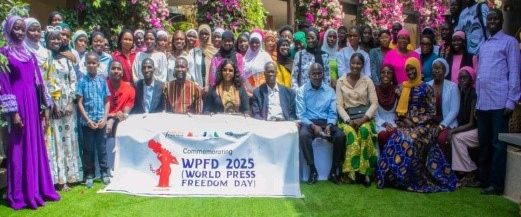By Assan Bah
Journalists from various media outlets across The Gambia have raised serious concerns over what they describe as exploitative working conditions, inadequate salaries, lack of job security, and insufficient resources—conditions they say are undermining both their professional integrity and the quality of journalism in the country. These grievances were expressed during an open forum held as part of the World Press Freedom Day commemoration organised by the Gambia Press Union (GPU) on Friday, bringing together journalists, media proprietors, government representatives, and development partners.
The young media professionals lamented what they described as a culture of systemic exploitation in the media industry. They recounted experiences of working long hours without overtime compensation, receiving little to no pay for months, and being subjected to contracts—if any exist—that provide no job security or benefits. Many said these practices make it difficult to maintain ethical standards or pursue in-depth journalism, especially when facing pressures to survive financially.
“Journalists deserve to be treated with the same respect and dignity which they fight to uphold for others,” one young journalist said during the discussion. “How can we report fairly and objectively when we are constantly worried about our next meal or rent?”
Others decry that the media chiefs have still not increase their pay amid the rise in the cost of living.
In her welcome remarks, GPU President Isatou Keita echoed these concerns, emphasizing that many young journalists—particularly women—are overworked, underpaid, and often exploited by some media houses. She said the current pay structures within several media institutions fall far below the threshold for a decent standard of living. “In many cases, these small salaries are not only insufficient to support a decent life in any part of the country but are also delayed by as much as three months or more,” she said.
Keita called on media proprietors to take urgent steps to address these long-standing issues, urging them not only to sign but also to fully implement the GPU’s collective bargaining agreement, which is designed to safeguard the rights of media workers. “These conditions are highly unacceptable,” she declared. “We should hold ourselves to the same standards of accountability and fairness that we demand from others.”
Demba Kandeh, a media expert representing Freedom House, pointed out that many of the labor issues faced by journalists stem from the absence of formal employment contracts. He recommended that media houses adopt performance-based contracts as a way to ensure transparency, security, and accountability in journalist-employer relationships. “Most of the journalists we have interacted with do not even have employment contracts. That’s the first structural problem that needs to be fixed,” he noted.
On the other side of the debate, Fatou Camara, proprietor of The Fatu Network, said while media owners acknowledge these challenges, their capacity to address them is severely hampered by the financial difficulties facing private media in The Gambia. She cited the drastic drop in advertising revenue and the absence of government subventions as critical challenges affecting the sustainability of media operations.
“It’s not that media owners do not care about their staff,” she said. “The reality is that we simply do not have the resources. We rely heavily on subscriptions and advertisements—which have significantly declined. We also have to purchase equipment, maintain vehicles, pay for coverage, and meet tax obligations.”
Camara’s remarks underline the broader economic fragility of the media industry in The Gambia, where private outlets operate with limited support and infrastructure in a highly competitive and resource-strapped environment.
The open forum served as both a platform for venting frustrations and a call to action for structural reforms in the media sector. Many participants agreed that without stronger legal protections, improved working conditions, and a better economic environment, the country’s media industry risks losing its brightest talents and undermining its democratic function as a watchdog and public educator.
As the global theme for this year’s Press Freedom Day—“A Press for the Planet: Journalism in the Face of the Environmental Crisis”—reminded the public of journalism’s vital role, Gambian journalists used the occasion to demand that their own rights and welfare also be protected to ensure the sustainability and independence of the profession.



















